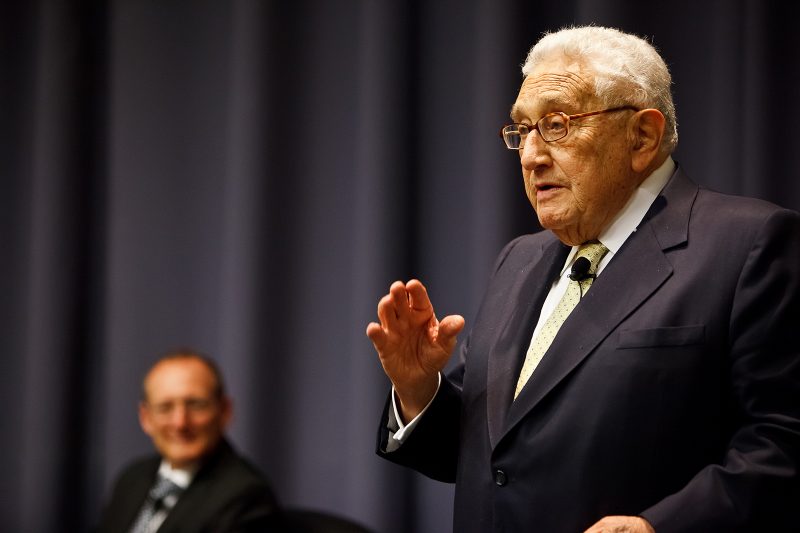President Richard C. Levin and statesman Henry A. Kissinger participated in a conference on U.S.-China relations held at at Yale March 30-31, which featured numerous distinguished practitioners and scholars. Titled “Sino-American Relations in 2022: The Future of the International System,” the conference was the first such event of the newly established Johnson Center for the Study of American Diplomacy, made possible by Kissinger’s recent donation of his papers to Yale and gifts from Charles B. Johnson ’54 and Nicholas F. Brady ’52.
The foundation of the Johnson Center is the Kissinger Archives at Yale University, a collection of approximately one million documents and objects covering Kissinger’s life as a diplomat, scholar, teacher, and private citizen. As a program of the Jackson Institute for Global Affairs, and in collaboration with International Security Studies and the Brady-Johnson Program in Grand Strategy, the Johnson Center will bring prominent statesmen and academics to campus as Kissinger Senior Fellows and Kissinger Visiting Scholars, as well as host an annual conference and a variety of other events relating to international affairs.
Levin and Kissinger opened the conference with welcoming remarks on March 30 in the Luce Hall auditorium. Kissinger then moderated a panel of renowned experts featuring William Burns, deputy secretary of state; Michael Mullen, former chair of the Joint Chiefs of Staff; Robert Rubin ’64 J.D., former secretary of the U.S. Treasury; and Jonathan Spence, Sterling Professor Emeritus of History at Yale.
“This conference highlights the exciting potential of the Johnson Center for the Study of American Diplomacy, and of Dr. Kissinger’s continued association with Yale in the years ahead,” said Levin. “Yale is thrilled to be the home for Dr. Kissinger’s papers, which will provide an extraordinary resource for future scholarship. We are deeply grateful to Charlie Johnson and Nick Brady for supporting this wonderful initiative.”
“This impressive conference affirms my belief that Yale will serve as an excellent home for studies on international relations,” remarked Kissinger. “I know that the Johnson Center will thrive given Yale’s unparalleled academic programs and library collections in world affairs.”
“The Johnson Center is an outstanding addition to the Jackson Institute for Global Affairs,” said Professor James Levinsohn, the institute’s director. “Events such as these are invaluable for our students. The Kissinger Senior Fellows and Kissinger Visiting Scholars will dramatically expand our teaching of statecraft and diplomacy.”
“It is fitting that the Johnson Center’s first conference focused on U.S.-China relations,” noted Professor John Lewis Gaddis, director of the Brady-Johnson Program in Grand Strategy. “Nearly 40 years ago to the day, Dr. Kissinger accompanied President Nixon on his historic trip to China. Nobody has contributed more to the development of America’s relationship with China than Henry Kissinger.”
The second day of the conference, March 31, included two additional panels that Kissinger attended. The first panel — moderated by Professor Paul Gewirtz of the Yale Law School, director of the China Law Center — focused on political and economic aspects of the U.S.-China relationship. The panel featured Cheng Li, director of research for the John L. Thornton China Center at The Brookings Institution; Stephen Roach, former chair of Morgan Stanley Asia and senior fellow at Yale’s Jackson Institute for Global Affairs; Ambassador J. Stapleton Roy, director of the Kissinger Institute on China and the United States at Woodrow Wilson International Center for Scholars; and Professor Susan Shirk, the Ho Miu Lam Chair in China and Pacific Relations and director of the Institute on Global Conflict and Cooperation at University of California–San Diego.
The second panel was moderated by Gaddis and focused on U.S.-China relations during the Cold War. The panel featured Professor Chen Jian, the Michael J. Zak Chair of History for U.S.-China Relations at Cornell University; Yafeng Xia, associate professor of history at Long Island University; Jeremy Friedman, postdoctoral fellow in the International Security Studies Program at Yale; and Sulmaan Khan, a Ph.D. candidate in Yale’s Department of History.
